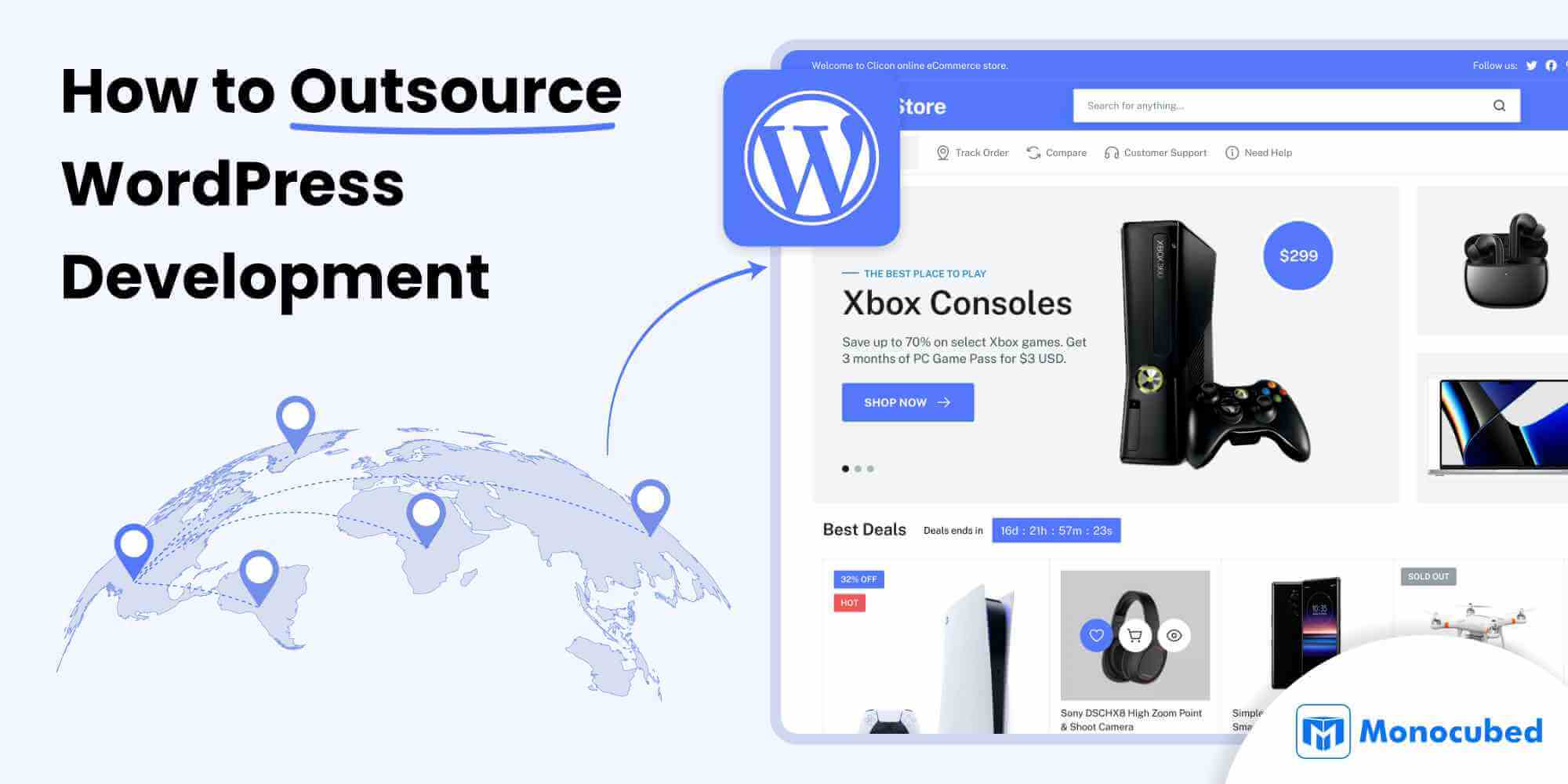Outsourcing WordPress development means hiring an external agency to handle WordPress-related projects such as custom WordPress websites, themes, plugins, and web solutions. This practice is common among businesses and digital agencies in the USA, UK, Canada, Australia, and Europe for several reasons:
- Lack of In-house Expertise: Keeping up-to-date with WordPress requires specialized knowledge that many companies do not have internally.
- Cost Efficiency: Outsourcing can be more cost-effective than maintaining a full-time, in-house WordPress development team.
- Scalability: It offers the flexibility to scale the development team up or down based on project needs without long-term commitments.
In fact, according to Straits Research, The global IT outsourcing market size was valued at USD 565.2 billion in 2022. The market is projected to grow at a CAGR of 9.3% from USD 565.6 billion in 2023 to USD 1416.3 billion by 2031.
And also, the reports by Grand View Research show that the global IT services outsourcing market was valued at USD 639.59 billion in 2022 and is expected to grow at a CAGR of 8.0% from 2023 to 2030. This highlights the growing dependence on external agencies for innovative and futuristic web solutions. This highlights the growing dependence on external agencies for innovative and futuristic web solutions.
So, if you are looking to outsource your project, read this complete guide that has all the information like the step-by-step process of outsourcing to a reliable WordPress development company, costs of outsourcing, top companies for outsourcing, and factors to take care of while outsourcing.
Let’s get started with why to outsource WordPress development.
Table of Contents
Reasons to Outsource WordPress Development for Your Next Project
Here are the reasons to outsource WordPress development.
- Access to Expertise: Outsourcing connects you with professionals who specialize in WordPress, ensuring high-quality development. These experts stay up-to-date with the latest WordPress features, plugins, and security measures.
- Cost Efficiency: Outsourcing can be more cost-effective than hiring a full-time developer, especially for projects with a defined timeline. Outsourcing eliminates the overhead costs of full-time employees, such as benefits, office space, and equipment.
- Focus on Core Business: By outsourcing development tasks, your internal team can focus on strategic activities that drive your business forward, such as marketing, customer service, and product development.
- Scalability and Flexibility: Outsourcing allows you to scale your development efforts up or down based on project demands without the commitment of long-term contracts. This flexibility is invaluable for businesses that experience seasonal fluctuations or are in growth phases.
- Faster Project Delivery: With a dedicated team of outsourced developers, projects can often be completed more quickly. These teams are adept at managing their workload and can dedicate focused time to your project, leading to faster turnaround times.
- Global Talent Pool: Outsourcing opens up a global talent pool, alHere are the steps to outsource WordPress development.
Since you know the process, let’s understand the process to outsource WordPress development.
How to Outsource WordPress Development
Here are the steps to outsource WordPress Development
-
Identify Your Project Requirements
Before you find a partner to develop your WordPress website, take the time to outline what you envision for your site. Are you looking to launch an online store, create a portfolio, or start a blog? Define your target audience, desired functionalities (such as contact forms, shopping carts, or booking systems), and any specific design preferences.
This clarity will not only help you communicate your vision but also ensure that you partner with a developer or agency capable of bringing your ideas to life. Consider current web trends and WordPress features that can enhance user experience, such as mobile optimization, SEO-friendly design, and security measures.
-
Research Potential WordPress Development Agencies or Freelancers
Your next step is to find a WordPress development partner that aligns with your project’s needs. This can be a freelance developer for smaller projects or an agency for more complex sites. Utilize online platforms like Upwork, Toptal, or Clutch to review portfolios, read client testimonials, and examine case studies.
This research phase is critical in finding a partner with a proven track record and the expertise necessary to execute your vision successfully. Consider reaching out to past clients or requesting direct demos to better understand their capabilities and work quality.
We suggest working with a WordPress development agency like Monocubed because Monocubed provides free consultation, signs an NDA, and also has experience in handling WordPress projects. Also, Monocubed provides flexible engagement models like fixed price, dedicated team, and hourly price models. You can choose the collaboration model as per your business requirements.
-
Evaluate Technical Skills and Expertise
When narrowing down your choices, evaluate each potential partner’s technical skills and WordPress proficiency. They should have solid experience in PHP, HTML/CSS, JavaScript, and a deep understanding of WordPress themes, plugins, and customization options. Discuss past projects similar to yours and ask how they managed specific challenges. This discussion can reveal their problem-solving abilities, adaptability, and whether they stay abreast of the latest web development trends, which are crucial for delivering modern, effective WordPress websites.
-
Discuss Budget and Timeline
Open and honest communication about your budget and project timeline is essential. A reputable developer or agency will provide a detailed proposal that outlines the scope of work, project milestones, payment schedule, and estimated delivery date. Make sure you understand what is included in the price to avoid unexpected costs. Don’t hesitate to negotiate terms that better suit your needs, but also be realistic about what can be achieved within your budget and timeframe.
-
Establish Communication and Project Management Protocols
Ensure smooth project progress by agreeing on the primary modes of communication (such as email, Slack, or project management software like Trello or Asana) and establishing regular check-ins. This setup helps keep you informed about your project’s status and facilitates timely feedback, adjustments, and decisions. Having a single point of contact can simplify communications, making the process more efficient and less prone to misunderstandings.
-
Conduct a Trial Project before you Outsource WordPress Development (Large Projects)
If your WordPress website development project is particularly ambitious or critical, you might opt for a trial project first. This approach allows you to evaluate the developer’s or agency’s work quality, reliability, and compatibility with your expectations before committing to the full project. It acts as a practical assessment that can prevent potential misunderstandings or disappointments in larger-scale collaborations.
-
Finalize Agreements and Contracts
To protect your interests and ensure a mutual understanding of the project’s scope, deliverables, timelines, and payment terms, it’s vital to finalize everything with a comprehensive contract. This contract should cover all project details, including confidentiality clauses and provisions for handling any disputes or changes to the project scope. Consulting with a legal professional to review the agreement before signing can prevent future complications.
Now, you know the process, let’s quickly go through the WordPress development services you can outsource for your WordPress project.
What Types of WordPress Development Services Can You Outsource?
There are several tasks and works that you can delegate as part of your project to outsource WordPress development. The following table summarizes different tasks that you can outsource:
| Work Category | Description |
|---|---|
| Custom Theme Development | Tailoring the visual layout and design of your site to meet unique brand standards. |
| Custom WordPress Plugin Development | Creating specialized plugins to add custom functionalities that are not available out of the box. |
| Full WordPress Website Design and Redesign | Crafting a new WordPress website from scratch or updating the existing design to improve aesthetics and user experience. |
| Performance Optimization | Enhancing site speed, responsiveness, and overall performance for better user engagement and SEO rankings. |
| Regular Maintenance or Support | Providing ongoing updates, bug fixes, and support tasks to ensure the site runs smoothly. |
The process of WordPress website development can be quite complex, especially depending on the idea being executed. It is always better to communicate your requirements with the development team and look forward to their input.
Let’s understand the cost incurred to outsource your WordPress development project.
Cost of Outsourcing WordPress Development Projects
The average cost of outsourcing a WordPress project ranges from $5,000 to $20,000 and beyond.
However, the cost of outsourcing a web project varies depending on multiple factors like the location of the outsourcing company, the complexity of the project, the expertise level of developers, the experience level of WordPress developers, and the scope of the work.
To help understand better the outsourcing cost of WordPrss development projects, here is a table.
| WordPress Website Complexity | Cost Range | Examples of Features |
|---|---|---|
| Simple WordPress Site | $5,000 – $7,000 |
|
| Medium WordPress Site | $7,000 – $15,000 |
|
| Complex WordPress Site | $15,000 – $20,000+ |
|
Additionally, consider factors like the costs of project management, quality assurance, and ongoing maintenance and support.
Let’s understand the strategies to manage your team while outsourcing your WordPress project.
10 Strategies to Manage WordPress Development Team While Outsourcing to WordPress Agency
Here are the top 10 tips to manage team while outsourcing.
Set Clear Expectations: Outline specific project goals, deadlines, and quality standards from the start.
- Use Comprehensive Project Management Tools: Implement tools like Trello, Asana, or Jira to track progress, assign tasks, and manage deadlines.
- Establish Regular Communication: Schedule daily or weekly stand-up meetings via video conferencing tools like Zoom or Google Meet to discuss progress, address issues, and stay connected.
- Create a Detailed Project Plan: Break the project into phases, milestones, and tasks with clear timelines to ensure organized progress.
- Implement a Version Control System: Use platforms like GitHub or Bitbucket for source code management, allowing for better collaboration and code version tracking.
- Encourage Transparency: Foster an environment where team members feel comfortable sharing challenges and feedback.
- Define Key Performance Indicators (KPIs): Identify and track KPIs relevant to project success, such as project timelines, bug rates, and adherence to specifications.
- Provide Clear Documentation: Ensure all project specifications, design guidelines, and development standards are well-documented and accessible.
- Leverage Time Zone Differences: If working across time zones, organize work to take advantage of nearly continuous progress.
- Offer Constructive Feedback: Regularly review work completed, provide actionable feedback, and recognize achievements to motivate the team and maintain high-quality standards.
Still have questions? Let’s understand in FAQ section.
Frequently Ask Questions About Outsourcing WordPress Development
-
Can outsourcing WordPress development save me money?
Yes, outsourcing WordPress development can save money by eliminating the need for in-house development resources, cost-effective, and allowing you to pay only for the specific services you need when you need them. The need for having an in-house web development team is virtually eliminated here.
-
What does the team structure look like in outsourced WordPress projects?
A streamlined team typically consists of a Project Manager for oversight, WordPress Developers for core development tasks, Front-end Developers for UI/UX design, Back-end Developers for server-side logic, and QA Specialists for testing and quality assurance.
-
How do you ensure the quality of the WordPress site?
Quality is assured through rigorous testing phases, including functionality tests, cross-browser compatibility checks, security audits, and performance optimization, adhering to WordPress coding standards and best practices.
-
Can outsourced teams integrate custom functionalities into my WordPress site?
Yes. Experienced WordPress developers can create custom themes, plugins, and add unique features tailored to your business needs, ensuring your site stands out and meets all your functional requirements.
-
What is the communication process during the development?
Regular communication is maintained via email updates, weekly video calls, and real-time messaging through platforms like Slack. Project management tools like Trello or Jira are used to track progress, tasks, and deadlines.
-
How is project confidentiality maintained?
A Non-Disclosure Agreement (NDA) is typically signed at the outset. The development company will also adhere to strict security protocols to protect your data and intellectual property throughout the development process.
-
What happens if I need changes or updates after the project is completed?
Most companies offer a warranty period for bug fixes and minor adjustments post-launch. For ongoing support and updates, a maintenance contract can be established to cover future needs.
-
How long does it take to develop a WordPress site?
A basic WordPress site might take 4-6 weeks, while a more complex site could take 3-6 months or more. Development time varies based on the project scale and complexity. Exact timelines are determined after scoping the project requirements.
Outsource Your WordPress Development Project to Monocubed
Outsourcing WordPress development helps businesses seek cost-effective solutions, specialized expertise, and faster time-to-market. By following the steps in this guide, you can find the right partner for your project.
Monocubed a leading WordPress development company in the USA and Canada, offers a team of skilled WordPress developers, has proven processes, and a commitment to deliver high-quality solutions. Contact us to discuss your WordPress-based web application development requirements and take your business forward with our expertise.
 By Jeel Patel
By Jeel Patel


